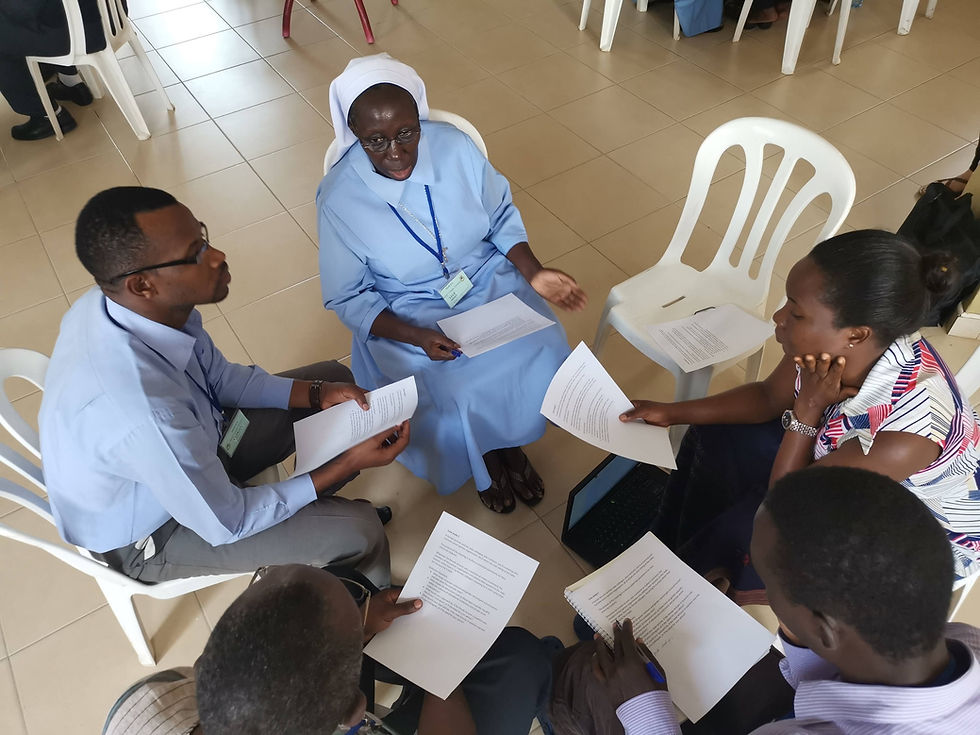The TESCEA approach to gender equity
- TESCEA team
- Oct 19, 2021
- 4 min read
Gender considerations run throughout all the TESCEA approaches. This is important to ensure that higher education transformation benefits all students.

For changes to university procedures, teaching approaches and stakeholder engagement to be effective, they must be inclusive of both men and women. In TESCEA, we have championed gender-responsive pedagogy, undertaken a range of gender sensitisation and awareness raising, as well as considered how policy reform can institutionalise these developments. Gender is highlighted throughout other cases in this series, too.

Gender-responsive pedagogy is an integral element of the Transforming Higher Education for Social Change approach and is pertinent within all aspects of teaching and learning, from lesson planning to assessment methods. It encourages academic staff to acknowledge and, where appropriate, to challenge, the social imbalances within their classes and beyond.
All four TESCEA universities facilitated sessions that focused on gender during their course redesign workshops. These sessions, now formally integrated into the Transforming Higher Education for Social Change toolkits, start by exploring key concepts (for example, the important distinction between gender and sex). They then interrogate how language, resources, and interactions within the learning space have a significant impact on a student’s ability to learn and engage.
In the words of Agrace Atwikirize, from Uganda Martyrs University (UMU),
“many [lecturers] confessed to having been gender blind, despite a diverse working experience. Some had never taken into consideration issues like the references they use, why female students don’t like sitting in some seats and prefer certain corners, even the language used that unconsciously was discriminative.”
Indeed, many of the behaviours that prevent equal participation are unconscious but, through these sessions, “…instructors have managed to see how gender bias was practised unintentionally during the facilitation of learning”, as Dr Felichesmi Lyakurwa from Mzumbe University, reflects.
For more information, and examples of how lecturers have adapted their lesson plans following TESCEA training read How to make gender classes more gender responsive by Mai Skovgaard, the TESCEA project manager, INASP.
Awareness raising around gender issues has also been conducted with other groups within the project. These include students, university administration/management, and stakeholders from industry and the community. This type of sensitisation is important, as it promotes systemic change.
Taking a step back, the partnership also worked to ensure that the delivery of TESCEA itself was gender responsive. At UMU and Gulu University, for example, faculty members with infants and young children were able to bring childcare support to workshops and were provided with food and accommodation. Other examples can be found throughout the other cases in this series.
Read also:
Challenges
During the project, we encountered a number of challenges. These included:
Level of Awareness All universities found that initial understanding of key gender terms and concepts was low.
Resistance “There is still a section of staff who view gender issues as irrelevant and uncalled for. They think that gender is for women issues and nothing beneficial to the male gender which is not true.” Agrace Atwikirize, lecturer at UMU
Hesitance to contribute Discussions of gender can bring up sensitive topics, and sometimes, people may be hesitant to contribute. During workshops and events, it is the responsibility of the facilitator to create a productive and positive learning space.
Recognising these challenges, the universities offer the following advice:
Promote awareness regularly: This can happen formally, as described above, or informally, by “…making sure that gender responsiveness is mentioned at every opportunity whether in official meetings or unofficial gatherings.” Professor Flora Fabian, University of Dodoma
Resources: Discussions about gender can be supported with resources. For example, in a workshop with the TESCEA universities’ Vice Chancellors, the BBC documentary ‘Sex for Grades’: Undercover in West African Universities was a powerful conversation starter.
Buy-in: The explicit support of university management is valuable, especially when addressing resistance.
Beyond TESCEA
Gulu University is advocating for the establishment of a Gender Mainstreaming Unit, which would be responsible for ensuring gender is considered in all aspects of the institution’s work, akin to the University of Dodoma’s Gender Coordination Unit. At Mzumbe University, it is the team of multipliers (see other case study) who are leading scale-out by facilitating awareness raising workshops across the different campuses. There are also plans to train the Mzumbe University’s gender group to build more capacity on gender-responsive pedagogy.
Gulu University is advocating for the establishment of a Gender Mainstreaming Unit, which would be responsible for ensuring gender is considered in all aspects of the institution’s work, akin to the University of Dodoma’s Gender Coordination Unit. At Mzumbe University, it is the team of multipliers (see other case study) who are leading scale-out by facilitating awareness raising workshops across the different campuses. There are also plans to train the Mzumbe University’s gender group to build more capacity on gender-responsive pedagogy.
To conclude, Professor Flora Fabian reflects that:
“…if gender awareness and gender responsive pedagogy is embedded in in [the] teaching – learning space, this will bring everyone on board not only in producing employable graduates with equal opportunity but…[raising] the economic power of both women and men and the society at large and as such, the growth and stability of the country as a whole”.
Written by Harriet Mutonyi and Josephine Dryden
With expert contributions from: Dr Christine Oryema (Senior Lecturer at Gulu University), Dr Felichesmi Lyakurwa (Senior Lecturer at Mzumbe University), Agrace Atwikirize (lecturer from Uganda Martyrs University) and Dr Flora Fabian (Professor at University of Dodoma).
Main picture: A gender exercise at Uganda Martyrs University. Credit: Tabitha Buchner

Comments